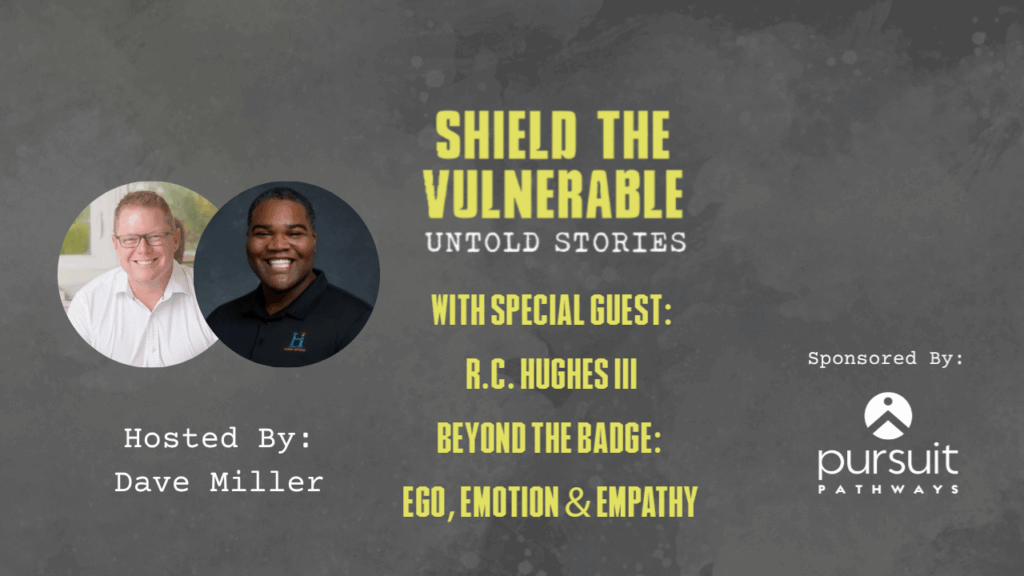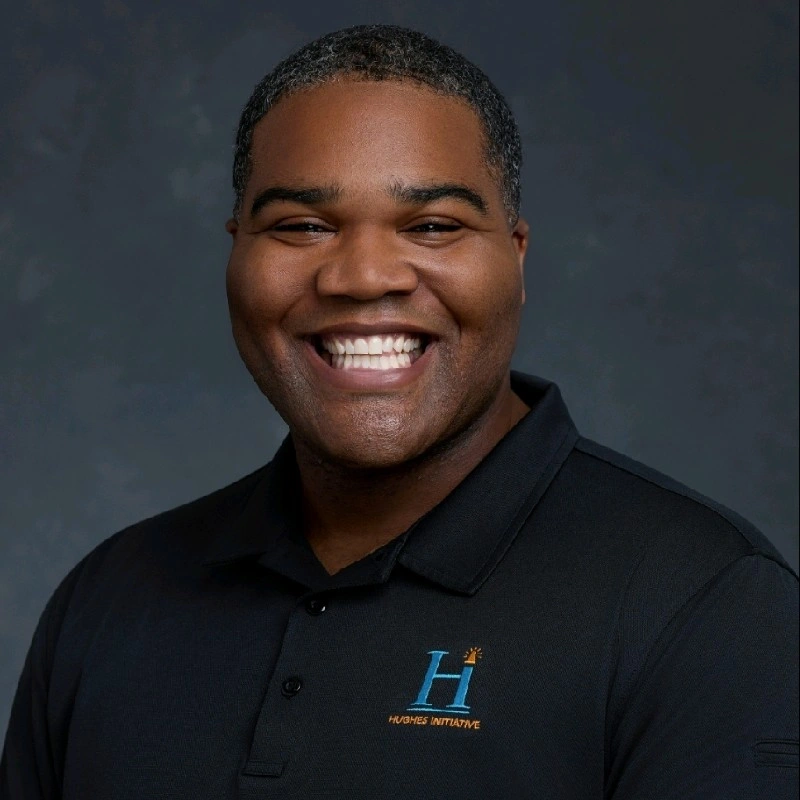Shield the Vulnerable – Beyond the Badge: Ego, Emotion & Empathy

In this episode of Shield the Vulnerable: Untold Stories, R.C. Hughes III—law enforcement trainer, leadership consultant, and founder of The Hughes Initiative—dives into the emotional realities of policing and how empathy and education can rebuild public trust.
Drawing from years of experience, R.C. explains how emotion, trauma, and ego shape communication between officers and civilians—and how emotional intelligence can restore civility on contact.
The E.A.R. Model
R.C. introduces the E.A.R. Model—Ego, Arrogance, and Rage—as the core emotional triggers that lead to conflict. He emphasizes that by understanding these factors, officers can prevent escalation and build awareness of their own responses before reacting.
“We see a huge disconnect between police officers and citizens—and the common thread is emotion,” R.C. explains. “If we can recognize ego and rage early, we can approach every encounter with humility and control.”
Trauma Behind the Badge
The conversation reveals how trauma, both personal and occupational, builds emotional walls. R.C. explains that these walls often appear as arrogance or detachment but are actually defense mechanisms formed from repeated exposure to pain and loss.
“The brain builds a wall to protect us from future pain,” he says. “But when we don’t deal with it, that wall starts to isolate us from others—and from ourselves.”
Negative Coping Mechanisms
R.C. outlines the “big four” coping mechanisms often found in policing: alcohol, drugs, pornography, and gambling. These behaviors, he notes, are attempts to escape emotional overload rather than process it.
“We all find ways to avoid the reality of who we are and what we’ve been through,” R.C. says. “But true healing comes from awareness, not avoidance.”
Logic vs. Emotion
Using simple real-world examples, R.C. contrasts logical and emotional conversations—like a speeding stop where logic meets defensiveness. The key to resolution, he says, lies in identifying whether the person in front of you is speaking from logic or emotion before responding.
“That’s where communication breaks down,” he explains. “We’re speaking two different languages—logic and emotion.”
Humility in Uniform
Teaching ego-awareness, R.C. helps officers reflect on how arrogance forms and how humility can transform interactions. “When you teach officers what ego really is,” he says, “you’re teaching them to look in the mirror and realize they’re not perfect. That’s where grace begins.”
Civility on Contact
Through The Hughes Initiative, R.C. trains both the public and law enforcement on what he calls “civility on contact.” The goal is to ensure every interaction starts from a humanized, respectful place—before procedure or protocol.
“Everything must begin with respect,” he says. “Professionalism and empathy go hand in hand.”
Being Seen Without Performing
R.C. touches on the emotional need to feel seen without constantly proving worth. “Some officers struggle with being silent because silence feels like invisibility,” he explains. “We need to learn that being present doesn’t always mean performing.”
The Eddie Brock Cop
In one powerful analogy, R.C. compares ego-driven officers to Eddie Brock—taken over by the symbiote until it consumes their identity. “When the uniform becomes who you are,” he warns, “everything turns negative—the job, the people, even yourself.”
Removing the Armor
Closing the conversation, R.C. urges officers to learn how to mentally take the uniform off. “Like Tony Stark’s suit,” he says, “if you never remove it, it will kill you from the inside.” True strength, he explains, is learning to separate identity from occupation.
“You must learn from the very beginning to not wear that uniform all the time,” he says. “That’s the only way to stay human.”
Final Thoughts
R.C. Hughes III reminds us that policing—and leadership in general—is deeply human work. Through emotional intelligence, self-awareness, and humility, we can move beyond confrontation toward connection.
This episode of Shield the Vulnerable calls for a new kind of strength—one rooted not in authority, but in empathy and understanding.
About R.C. Hughes III
R.C. Hughes III is the founder and driving force behind The Hughes Initiative—a leadership and training organization dedicated to redefining trust, emotion, and accountability in law enforcement and public safety.
With extensive experience training officers across local, state, and federal levels, R.C. developed the E.A.R. Model (Ego, Arrogance & Rage) to uncover how trauma, emotion, and identity influence decision-making in high-stakes environments.
Under his leadership, The Hughes Initiative has built programs that connect law enforcement professionals with the communities they serve—emphasizing “civility on contact,” emotional intelligence, and authentic human engagement during stressful encounters.
His approach shifts the focus from authority to awareness and from conflict to connection.
At the core of R.C.’s mission is resilience: helping officers become not just better professionals, but healthier individuals. His training encourages self-reflection, off-duty wellness, and emotional regulation as essential tools for long-term success.
He openly addresses the risks of unchecked ego and burnout, showing how small human habits can grow into cultural transformation.
By challenging outdated power structures and encouraging vulnerability, R.C. is helping to build pathways toward public safety rooted in empathy, understanding, and shared responsibility.
Whether you’re a police chief, community leader, or citizen advocate, his message remains the same:
true leadership begins with self-awareness and connection.

